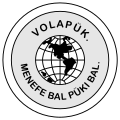Volapük
constructed international auxiliary language From Wikipedia, the free encyclopedia
Volapük (pronounced IPA: [ˈvɒləˌpʊk] in English, IPA: [volaˈpyk] in Volapük) is a constructed language created in 1880 by Johann Martin Schleyer. Schleyer was a Catholic priest from Germany. He felt that God had told him in a dream to make an international language. The name "Volapük" comes from the words "vol" (world) and "pük" (language). Volapük conventions took place in 1884, 1887, and 1889. The aim was to help people from different cultures speak to each other.
| Volapük | |
|---|---|
 Logo of the Volapük movement (2nd phase) | |
| Created by | Johann Martin Schleyer |
| Date | 1879–1880 |
| Setting and usage | International: mostly in Europe |
| Users | (20 cited 2000)[1] |
| Purpose | |
| Latin | |
| Sources | vocabulary from English, German, and French |
| Official status | |
| Regulated by | Kadäm Volapüka |
| Language codes | |
| ISO 639-1 | vo |
| ISO 639-2 | vol |
| ISO 639-3 | vol |
| Glottolog | None |
Volapük became less popular after 1887 when Esperanto was published. Part of the reason for this was that Esperanto is easier to learn with a simpler grammar. There are believed to only be 20-30 Volapük speakers in the world today.
The vocabulary of Volapük is mostly English, with some words from German and French. The grammar is based on Indo-European languages.

History
Volapük was created by Johann Martin Schleyer. He first wrote about his idea in 1887. He published a book about Volapük in 1880. The book was translated into ten languages. Soon, people started creating Volapük clubs in Europe.[2][3]
The language started to become popular. People published books and journals in Volapük. However, not everybody liked the language. The American Philosophical Society thought that Volapük was too complex.[2]
Example text
Below is the Lord's Prayer written in Volapük.
O Fat obas, kel binol in süls, paisaludomöz nem ola!
Kömomöd monargän ola!
Jenomöz vil olik, äs in sül, i su tal!
Bodi obsik vädeliki govolös obes adelo!
E pardolös obes debis obsik,
äs id obs aipardobs debeles obas.
E no obis nindukolös in tendadi;
sod aidalivolös obis de bas.
Jenosöd!
References
Other websites
Wikiwand - on
Seamless Wikipedia browsing. On steroids.
